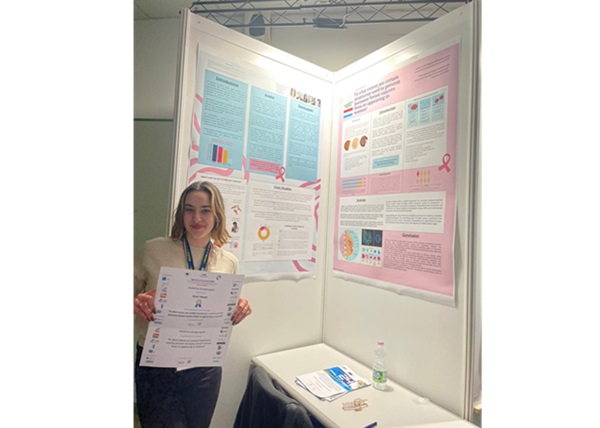 Credit: FJSL
Credit: FJSL
The Fondation Jeunes Scientifiques Luxembourg (FJSL) has announced that a young scientist aged nineteen, Aikaterina Karageorgiadi, represented Luxembourg at the Italian competition “I giovani e le scienze” (young people and science) in Milan from 16 to 18 March 2024.
Her project, which won a silver medal in the international projects category, was exhibited among 35 other booths: 25 Italian booths (selected all over the country) and ten international booths (with young prize-winners from several nations: Belgium, Brazil, Luxembourg, Mexico, the Basque “Country”, Portugal, Spain, Taiwan, Tunisia and Turkey).
In March 2023, Aikaterina won her right to enter the Italian competition thanks to her performance in the Jonk Fuerscher national competition in Luxembourg. Her biology/medicine project entitled “To what extent are certain treatments used to prevent hormone breast cancers from re-appearing in women” impressed the jury with its great maturity.
The starting point for Aikaterina's meticulous work was a shocking event: the discovery of breast cancer in her mother when she was just eleven years old. As a bright and determined student, she immersed herself in the specialised literature to produce an exhaustive review of this disease, which affects one woman in eight at least once in her lifetime, as well as men more occasionally. Aikaterina has clearly explained the state of the art in cancer treatment. She also conducted very moving case studies of three patients suffering from different stages of breast cancer (1, 2 and 3), to give a better understanding of the treatments currently used to limit the recurrence of the disease.
Back in Oxford, where Aikaterina is now studying for a Bachelor’s degree in biology, the student reflected on her “career” as a young scientist: “After travelling with FJSL in two destinations the previous year, my trip to Milan made it on the top of the list. Within three days, l met brilliant young minds [with whom] I am hoping to have the chance to reconnect and collaborate.”








